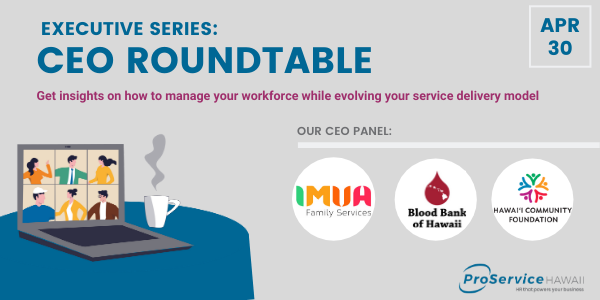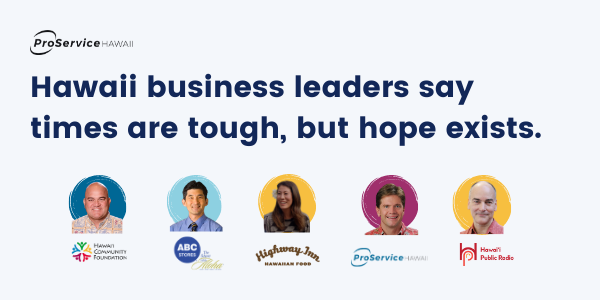Answering Community Needs with Adaptable Leadership
The sudden onset of community needs have forced local businesses to become more agile within their organizations while staying true to their missions. In episode 2 of our Executive Series CEO Roundtable we asked these trusted leaders how they are managing and motivating their workforce while evolving their service delivery models amidst times of intense pressure. What we found was tremendous leadership and examples of creating good from this crisis.
Our panel for Episode 2 featured:
- Dean Wong, Executive Director, Imua Family Services
- Kim-Anh Nguyen, CEO, Blood Bank of Hawaii
- Micah Kane, President and CEO, Hawaii Community Foundation
- Ben Godsey, President and CEO, ProService Hawaii
Here are a few of our takeaways.
Always Opportunity in Crisis
As a business model, nonprofits always seem to survive and respond to crisis situations with much flexibility and resolve. What they do and how they do it becomes less evident than the “why.” Here are some examples of how the “why” drives new opportunities to arise in a crisis:
- New Leaders Emerge: When the going gets tough, the tough get going. New leaders emerge within organizations based on their actions and beliefs, not their title or compensation. We must engage employees so they will have the confidence to think innovatively and out of their comfort zone. Get the most effective people in the right seats and “get out of their way!”
- Trust Instincts, Set Priorities, and Execute Quickly: Leadership is even more critical in a crisis. CEOs will be forced to work differently in order to respond quickly to the ever-changing landscape. That is why it’s imperative that leaders set a few priorities, develop a quick framework and then run…. focusing on excellent execution. Mistakes will be made and goals will change but utilizing data and course-correcting are the leadership qualities necessary to move with the tide.
- Breakthrough With Innovation: The weight of a crisis can weigh heavily on an organization when need is critical and capacity is questionable. Innovation is key such as new uses of existing assets, new revenue streams, or embracing technology. Fundamental changes to the business model will keep things moving forward.
Collaboration Over Competition
In peace times, partnerships and collaboration can be hard. But times of crisis sometimes calls for a united front in community efforts. Competition is no longer what drives productivity but rather a much needed response for good. We learn that we must work together in order to balance the health of our economy with the health of citizens. This creates sufficient motivation to make collaborative efforts work. And come together quickly and powerfully then otherwise imaginable.
This crisis has allowed for important collaboration to collect critical information in order to plan better for the next crisis. While beneficial to the community, the real win is creating cause-fighting coalitions that never existed before.
Good Business is Good Business
Whether you are a nonprofit or for profit, purpose-driven decisions reaps good business decisions that will weather any storm. Leaders must often change their frame of reference before they can respond effectively to the needs of their constituents. Leadership courage at the core is thoughtful, purposeful and informed decisions in action!
Episode 2 of our Executive Series revealed proven leadership examples within our nonprofit sector and best practices for any business to acquire during a time of crisis. Though our panelists represent the non-profit sector, they’re excellent leaders first and foremost. And their lessons are applicable to all leaders. We thank them for an honest and insightful view into how they are managing through tense times in the community and in their organizations. Stay tuned for episode 3 (more details coming soon).









